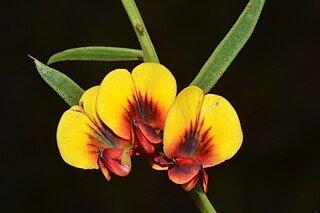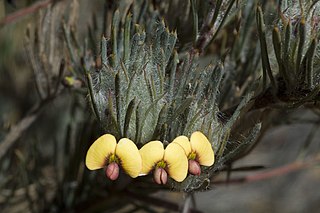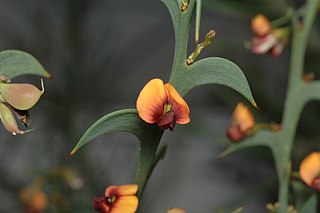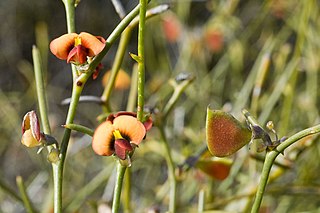
Daviesia divaricata, commonly known as marno, is a species of flowering plant in the family Fabaceae and is endemic to the south-west of Western Australia. It is a low, spreading or erect and bushy shrub with phyllodes reduced to small, triangular scales, and orange and maroon flowers.

Daviesia buxifolia, commonly known as box-leaf bitter-pea, is a species of flowering plant in the family Fabaceae and is endemic to south-eastern continental Australia. It is an open shrub with egg-shaped to round phyllodes and yellow or yellowish-orange and maroon-brown flowers.

Daviesia abnormis is a species of flowering plant in the family Fabaceae and is endemic to the south-west of Western Australia. It is an erect, hairy shrub with sharply-pointed, narrow elliptic to narrow egg-shaped phyllodes with the narrower end towards the base, and yellow flowers with faint red markings.

Daviesia angulata is a species of flowering plant in the family Fabaceae and is endemic to the south-west of Western Australia. It is an erect, spreading shrub with prickly, flattened phyllodes, and yellow flowers with red markings.

Daviesia apiculata is a species of flowering plant in the family Fabaceae and is endemic to the south-west of Western Australia. It is an erect, bushy shrub with scattered, erect phyllodes with a point on the end, and yellow flowers with a red tinge.

Daviesia cardiophylla is a species of flowering plant in the family Fabaceae and is endemic to the southwest of Western Australia. It is an erect, spreading shrub with heart-shaped, sharply pointed phyllodes and yellow and red flowers.

Daviesia croniniana is a species of flowering plant in the family Fabaceae and is endemic to the south-west of Western Australia. It is a compact, bushy shrub with hairy foliage, erect, broadly linear phyllodes and yellow or orange and reddish-brown flowers.

Daviesia daphnoides is a species of flowering plant in the family Fabaceae and is endemic to the south-west of Western Australia. It is a bushy or spreading shrub with glabrous foliage, sharply-pointed narrow elliptic to egg-shaped phyllodes with the narrower end towards the base and yellow and dark red flowers.

Daviesia aphylla is a species of flowering plant in the family Fabaceae and is endemic to the south-west of Western Australia. It is an erect, bushy shrub with glabrous foliage, up to six sharply-pointed phyllodes on each branchlet, and orange-red and yellow flowers.

Daviesia dilatata is a species of flowering plant in the family Fabaceae and is endemic to the south-west of Western Australia. It is an erect, open, glabrous shrub with scattered, often sickle-shaped phyllodes, and orange, red, yellow and dark crimson flowers.

Daviesia elongata is a species of flowering plant in the family Fabaceae and is endemic to the south-west of Western Australia. It is a glabrous, spreading or sprawling shrub with narrowly egg-shaped to linear phyllodes and yellow-orange and maroon flowers.

Daviesia emarginata is a species of flowering plant in the family Fabaceae and is endemic to the south-west of Western Australia. It is an erect, mostly glabrous shrub with scattered egg-shaped phyllodes with the narrower end towards the base and with a notch at the tip, and yellow and pink flowers.

Daviesia epiphyllum, commonly known as staghorn bush, is a species of flowering plant in the family Fabaceae and is endemic to the south-west of Western Australia. It is a rigid, erect, spreading, glabrous shrub with flattened, staghorn-shaped phylloclades with sharply-pointed lobes, and yellowish-red flowers.
Daviesia eremaea is a species of flowering plant in the family Fabaceae and is endemic to central Australia. It is an erect, glabrous, multi-stemmed shrub with needle-like, more or less sharply-pointed phyllodes, and yellow and red flowers.

Daviesia euphorbioides, commonly known as Wongan cactus, is a species of flowering plant in the family Fabaceae and is endemic to a restricted area in the south-west of Western Australia. It is an open, erect to sprawling, cactus-like shrub with thick, fleshy branchlets and phyllodes reduced to scattered, sharply-pointed spines, and bright yellow, reddish-brown and maroon flowers.

Daviesia flexuosa is a species of flowering plant in the family Fabaceae and is endemic to the south-west coast of Western Australia. It is a glabrous, spreading shrub with zig-zagged branchlets, scattered, sharply-pointed, narrowly triangular phyllodes and yellow and red flowers.

Daviesia longifolia is a species of flowering plant in the family Fabaceae and is endemic to the south-west of Western Australia. It is an erect, many-stemmed shrub with scattered, erect, cylindrical phyllodes and yellow and red flowers.

Daviesia major is a species of flowering plant in the family Fabaceae and is endemic to the south-west of Western Australia. It is an erect, many-stemmed shrub with scattered, erect, sharply-pointed, cylindrical phyllodes and orange and red flowers.

Daviesia megacalyx is a species of flowering plant in the family Fabaceae and is endemic to a restricted part of the south-west of Western Australia. It is an erect, glabrous shrub with scattered, leathery, elliptic phyllodes and apricot-coloured and deep pink flowers.

Daviesia microphylla is a species of flowering plant in the family Fabaceae and is endemic to the south-west of Western Australia. It is an openly-branched, sprawling shrub with spiny branchlets, crowded, sharply-pointed, egg-shaped phyllodes, and orange, dark red and maroon flowers.



















